EVENT CANCELED
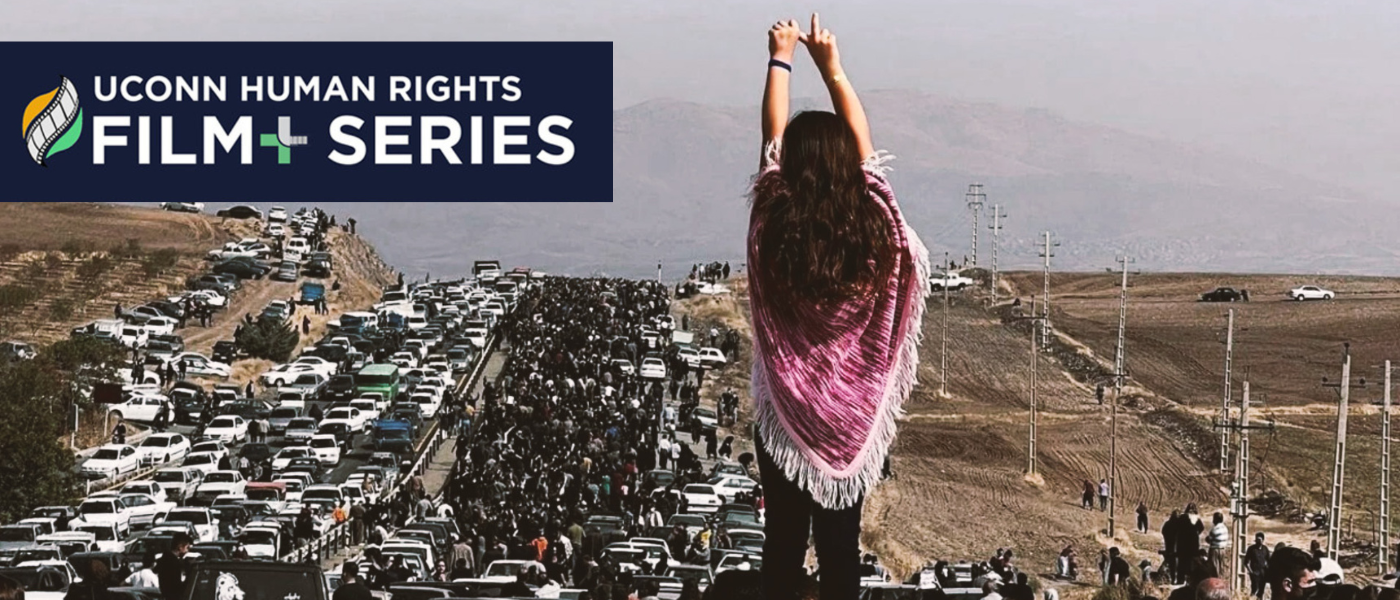
The Human Rights Film+ Series is sponsored by the Human Rights Institute, Dodd Human Rights Impact, and the Department of Digital Media and Design.
EVENT CANCELED

The Human Rights Film+ Series is sponsored by the Human Rights Institute, Dodd Human Rights Impact, and the Department of Digital Media and Design.
The Human Rights Film+ Series is sponsored by the Human Rights Institute, Dodd Human Rights Impact, and the Department of Digital Media and Design.
Wednesday, November 30, 2022
4:00 pm – 5:15 pm
The Dodd Center for Human Rights – Room 162
In Person & Online
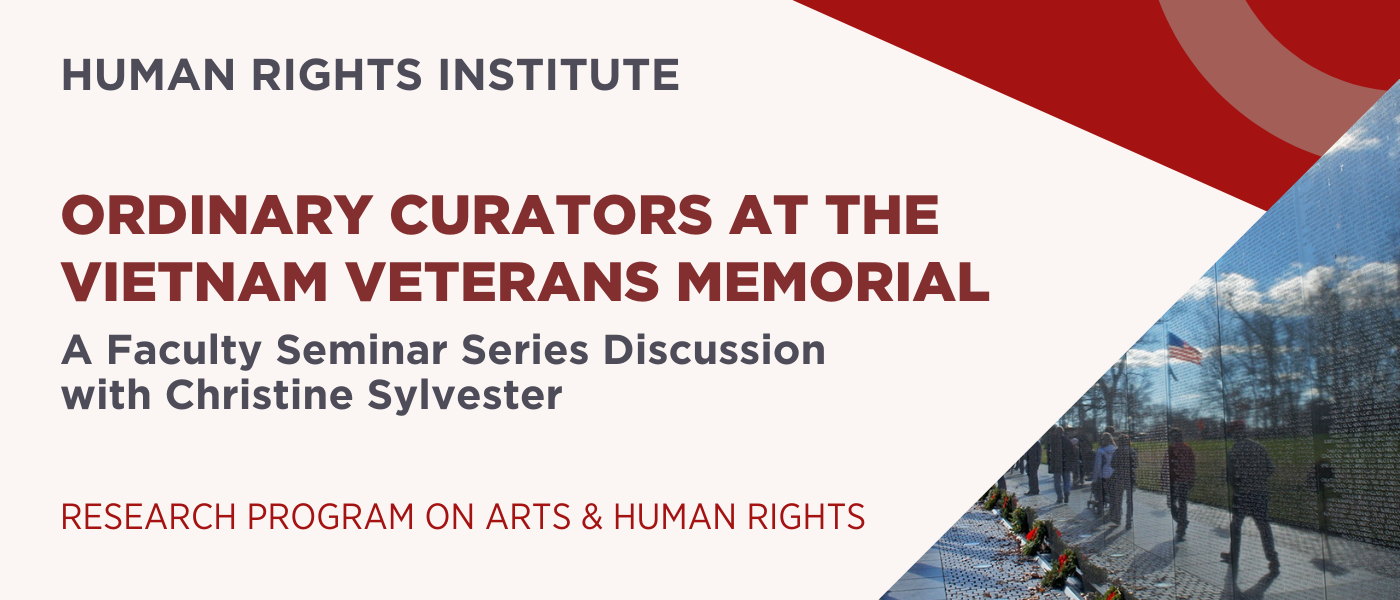
This talk will draw on a companion article to Christine Sylvester’s recent book Curating and Re-Curating the American War in Vietnam and Iraq (Oxford, 2019). Published in the International Relations journal Security Dialogue, “Curating and Re-Curating the American War in Vietnam” (2018) explores the Vietnam Veterans Memorial in Washington as a “museum” site where “ordinary curators” authorize themselves to re-curate the war to put mortality –not state, honor or soldier heroism –at the heart of it. The piece mixes elements of new museum thinking with consideration of object assemblages composed and left at the Memorial, as well as the personal memories Nobel Laureate Orhan Pamuk curates into a museum to lost love in his novel The Museum of Innocence (2008). It challenges a field known for abstract theory to humanize its knowledge base by noticing ordinary civilians re-curating inherited versions of war.
This event will take place in-person
in The Dodd Center for Human Rights.
It will likewise be available online
on Zoom. Please register regardless
of the modality you plan to join.
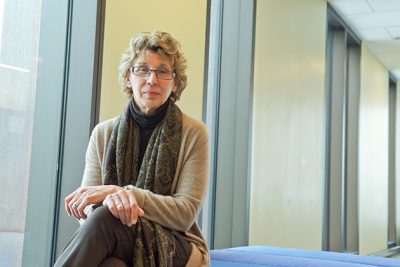
Christine Sylvester is sole author of 7 books on International Relations, among them Art/Museums: International Relations Where We Least Expect It (Routledge), Feminist International Relations: An Unfinished Journey (Cambridge) and Producing Women and Progress in Zimbabwe (Heinemann). She has held the Swedish Research Council’s Kerstin Hesselgren Professorship, a Leverhulme fellowship at SOAS University of London, and was an Eminent Scholar of the Feminist Theory and Gender Studies Section of the International Studies Association. She was named one of Fifty Key Thinkers in International Relations (Griffiths, Roach, Solomon), and today’s article was among 20 pieces recognized for pushing academic boundaries of security thinking over the 50-year history of Security Dialogue (M. Murphy, 2020).
The Research Program on Arts & Human Rights explores how the arts can promote the full exercise of human rights and the consolidation of a democratic culture. It is a proud collaboration between the Human Rights Institute and the School of Fine Arts.
Thursday, December 8, 2022
4:00 pm – 5:30 pm
Konover Auditorium
The Dodd Center for Human Rights
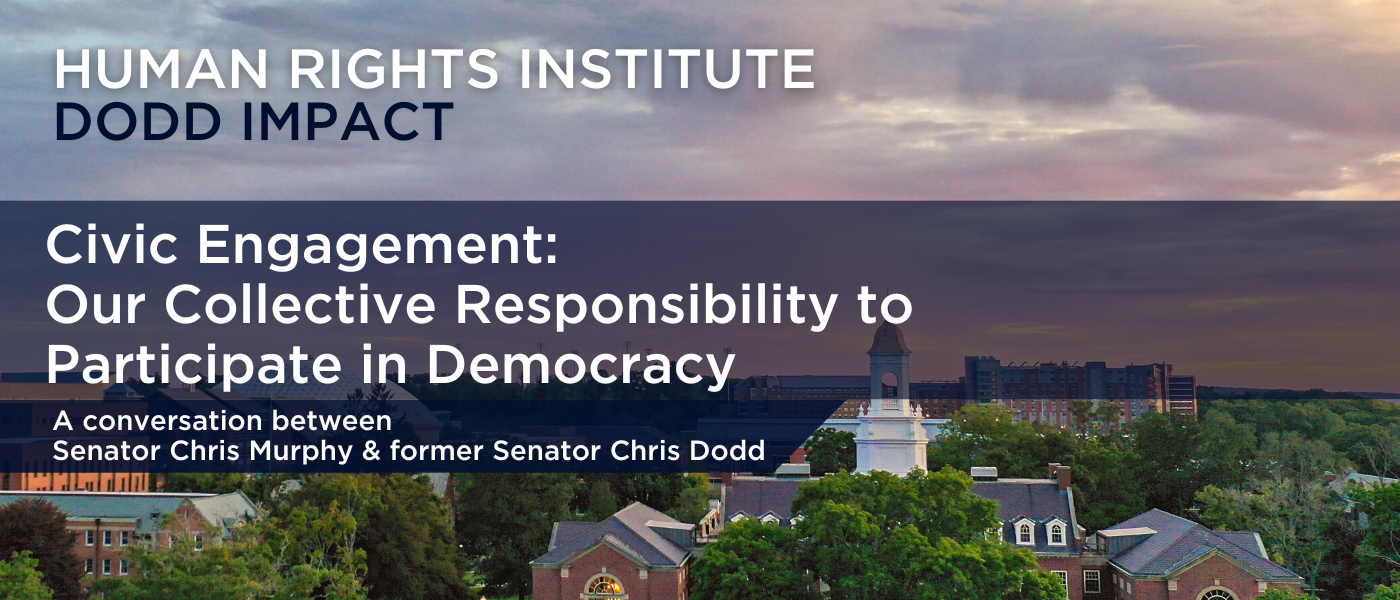
In a time of unprecedented partisanship and political divisiveness, what role do we all as individuals play in fostering/cultivating a robust democracy with respect for human rights? Join us to consider these and other questions about the central role of civic engagement in the United States today.
Opening remarks will be delivered by former Senator Chris Dodd. Special guest Senator Chris Murphy of Connecticut will be joining us from Washington. Professor and President Emeritus Susan Herbst will serve as moderator.
This discussion is made possible by Travelers.
Thank you for your interest in joining us! We have unfortunately reached the seating capacity for the room. If you would still like to still attend, we will happily accept walk-ins for any remaining available seats when the event begins.
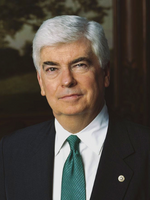 Christopher J. Dodd represented Connecticut in the United States Congress for 36 years – three terms in the U.S. House of Representatives and five terms in the U.S. Senate. Senator Dodd was a widely respected legislator and a key participant in nearly every major national policy debate over his four decades of public service. He authored or co-authored major legislation in the areas of education, health, financial services, foreign policy, and election reform.
Christopher J. Dodd represented Connecticut in the United States Congress for 36 years – three terms in the U.S. House of Representatives and five terms in the U.S. Senate. Senator Dodd was a widely respected legislator and a key participant in nearly every major national policy debate over his four decades of public service. He authored or co-authored major legislation in the areas of education, health, financial services, foreign policy, and election reform.
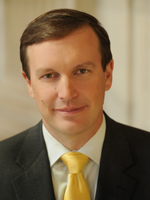
Chris Murphy, United States Senator for Connecticut, has dedicated his career to public service as an advocate for Connecticut families. Senator Murphy has been a strong voice in the Senate fighting for affordable health care, sensible gun laws and a forward-looking foreign policy. As a member of the Foreign Relations Committee, he has been an outspoken proponent of diplomacy, international human rights and the need for clear-eyed American leadership abroad. Murphy currently serves as the Chairman of the Subcommittee on Near East, South Asia, Central Asia and Counterterrorism.
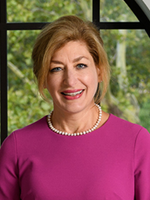
If you require an accommodation to participate in this event, please contact humanrights@uconn.edu.
Wednesday, February 1, 2023
12:00 pm – 1:30 pm
In Person and Online
Heritage Room – Homer Babbidge Library
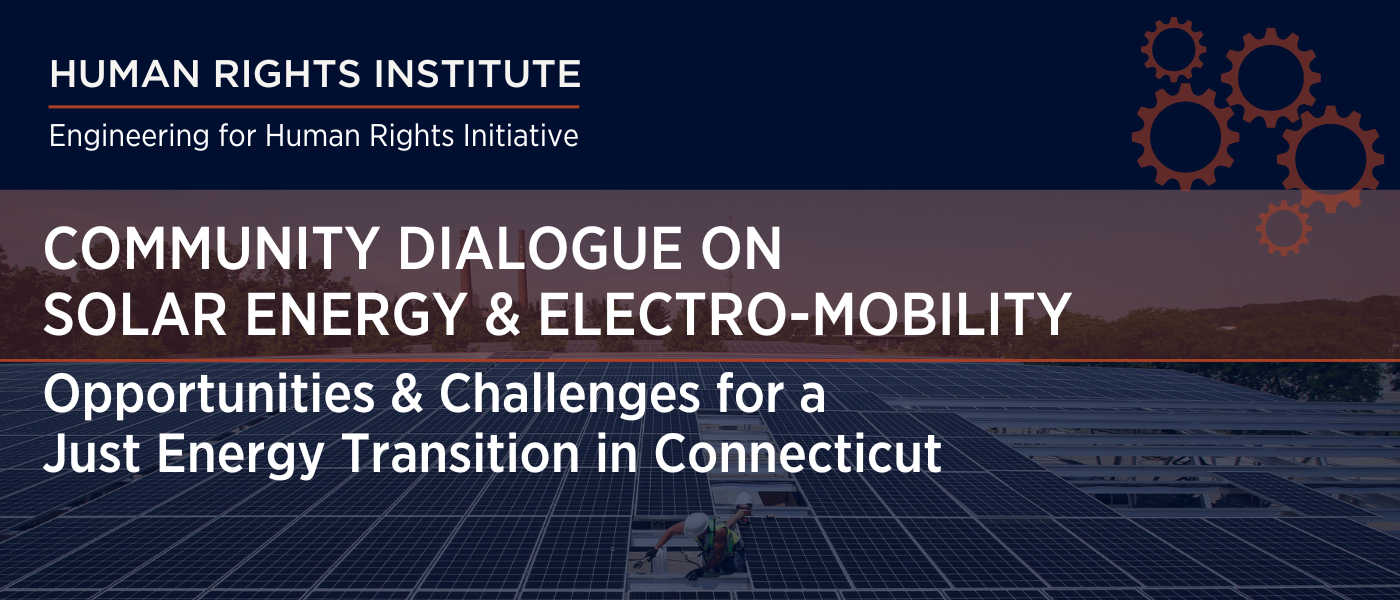
Clean energy has become one of the key strategies to mitigate and reduce the effects of climate change, reduce oil dependency, improve the quality of our environment, and reduce household expenses on energy. However, the benefits from energy production and distribution have not been equally experienced by all communities. And the negative social and environmental consequences have not been equally shouldered. The clean energy transition may be an opportunity to redress some of those inequalities.
Please join us for an event aimed at fostering dialogue among community representatives, researchers, and policymakers interested in the equity implications of solar energy and electric mobility. Together, we’ll explore the sustainability and human rights challenges and opportunities that the clean energy revolution might bring to these sectors. We’ll focus, in particular, on the situation of historically underserved communities in Connecticut.
Faculty members from the University of Connecticut’s School of Engineering and Human Rights Institute will share their research and all participants will engage in active discussion. In-person and hybrid options for participation are available.
This accessible event is free and open to the public, but registration is required.
The event will be hosted in the Heritage Room (Level 4 of the Homer Babbidge Libary), as well as online through Zoom.
A collaborative venture between the Human Rights Institute and UConn’s School of Engineering, the Engineering for Human Rights initiative is focused on making human rights an integral component of effective engineering practice. We are teaching tomorrow’s engineers risk management, climate resiliency, life-cycle analysis, and impact assessment. Our faculty specialize in research key to advancing human health, environmental sustainability, and industrial competitiveness. Together, we are focused on safeguarding people and nature, while advancing innovation.
If you require an accommodation to participate in this event, please contact humanrights@uconn.edu.
Tuesday, January 24, 2023
4:00 pm – 5:30 pm
Konover Auditorium
The Dodd Center for Human Rights
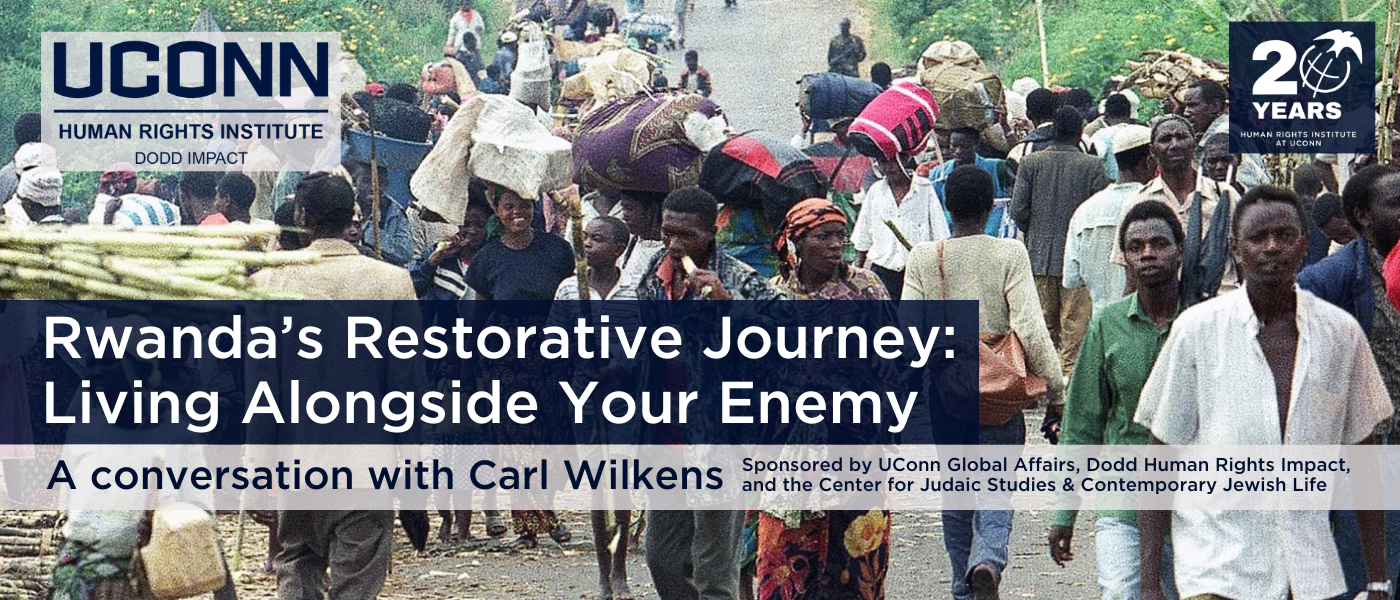
Three days into the 1994 Rwandan genocide against the Tutsi, Carl and Teresa Wilkens made the heart wrenching decision that she would take their young children to safety, and he would stay at their home in Kigali and try to help. Neither had any idea that during the next 100 days more than a million people would be slaughtered, often by their neighbors.
Through the sharing of first-hand accounts of the catastrophic 1994 genocide and the country’s rebuilding journey that followed, Carl will discuss restorative justice and practices and engage us in guided conversations about what those practices mean today, particularly in the realm of rebuilding trust.
This event is in-person only in the Konover Auditorium of The Dodd Center for Human Rights. All are welcome!
Register Here.
It is co-sponsored by UConn Global Affairs, the Center for Judaic Studies & Contemporary Jewish Life, and Dodd Human Rights Impact.

As a humanitarian aid worker, Carl Wilkens was one of two Americans who refused to leave Rwanda as thousands of expatriates and UN soldiers fled the country in the face of what is now known as the 1994 Rwandan genocide against the Tutsi. Working together with Rwandan colleagues they brought food, water, and medicine to orphans trapped around the city.
These days Wilkens travels around the globe using the transformative process of storytelling and restorative practices to explore topics such as polarization, harmful conflict, and belonging. He is the Co-founder and Director of World Outside My Shoes.
In advance of the event, we encourage you to watch the 40-minute documentary, I’m Not Leaving, available in full & free on YouTube.
This 40-minute documentary shares snapshots of the genocide through the eyes of Carl and his wife Teresa along with: Gasigwa, a courageous Rwandan colleague whose home became a safe-house, Laura from the US Embassy who wrestled with Washington, DC to not abandon their mission, and Phil, one of the handful of UN peacekeepers who volunteered to stay in Rwanda and were tenuously hanging on to save lives. Their gut-wrenching choices and unexpected alliances formed during the 100 days of slaughter leave us with a surprising sense of hope and agency.
If you require an accommodation to participate in this event, please contact humanrights@uconn.edu.
Thursday, October 13, 2022
2:00pm – 3:30pm
Hybrid Event
Dodd Center for Human Rights – Room 162 & Zoom
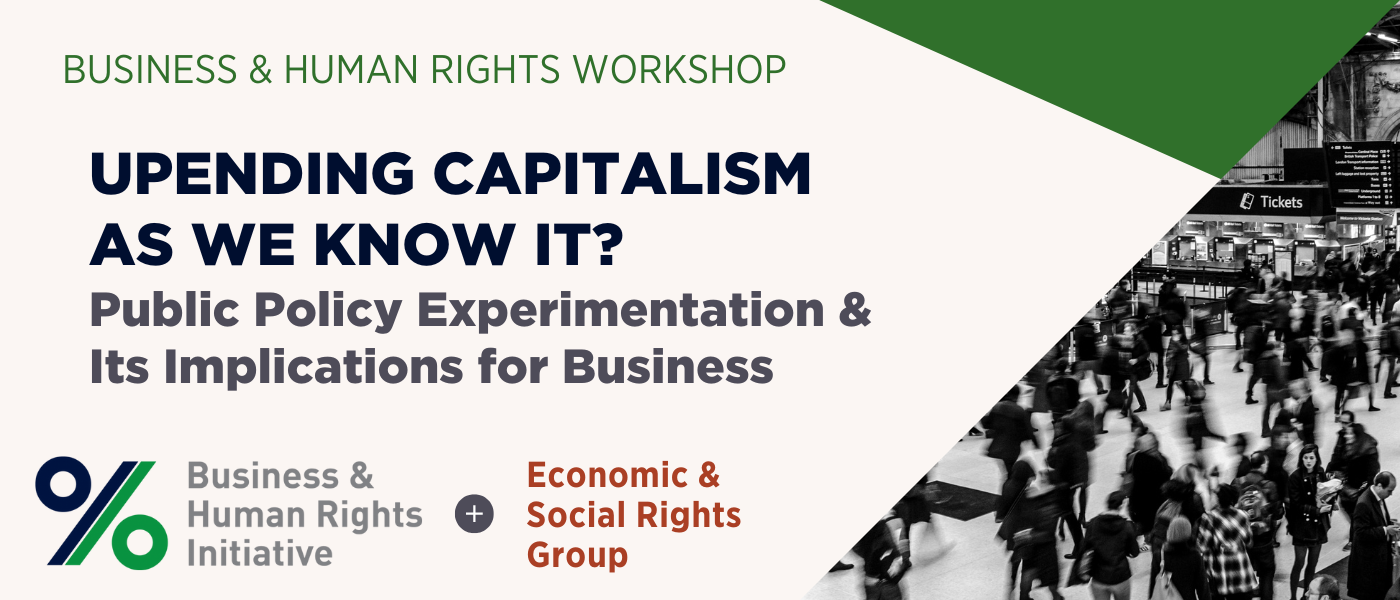
About This Workshop:
The Business and Human Rights Workshop is dedicated to the development and discussion of works-in-progress and other non-published academic research. Please register before the event for access to Professor Olsen’s paper.
Once thought to support democracy, contemporary global capitalism is contributing to its collapse. Despite the powerful systemic forces that propel it forward, though, citizens in many parts of the world are pushing back against systems that perpetuate climate change, corruption, and inequality. Simultaneously, innovative thinkers, alongside companies, citizen groups, and governments are experimenting to redress shortcomings in the status quo. Shifts in the way we define value (Mazzucato 2018), efforts to enact doughnut economies (Raworth 2017) or circular cities, and genuine corporate engagement (Knudsen and Moon 2017) each have important implications for a capitalism that is more supportive of democratic practice. In this paper we develop a framework that helps make sense of the varied implications such experiments have for business, trace how one successful experiment unfolded, and offer lessons it may hold for others. Doing so, we hope, will reinforce this trial, inspire others, and begin to help business leaders understand how they might engage in the various paths to a more democratic and prosperous future.

Prof. Tricia Olsen,
Daniels College of Business
University of Denver

Discussant:
Prof. Lyle Scruggs,
Department of Political Science
University of Connecticut
This workshop will be hosted both in-person and on Zoom. Please register regardless of the modality you wish to join. The workshop will not be recorded.
This event is hosted by the Business and Human Rights Initiative, a partnership between Dodd Human Rights Impact, the UConn School of Business, and the Human Rights Institute. It is co-sponsored by the Research Program on Economic & Social Rights in the Human Rights Institute.
Tuesday, October 25, 2022
4:00pm – 5:30pm
Dodd Center for Human Rights, Konover Auditorium
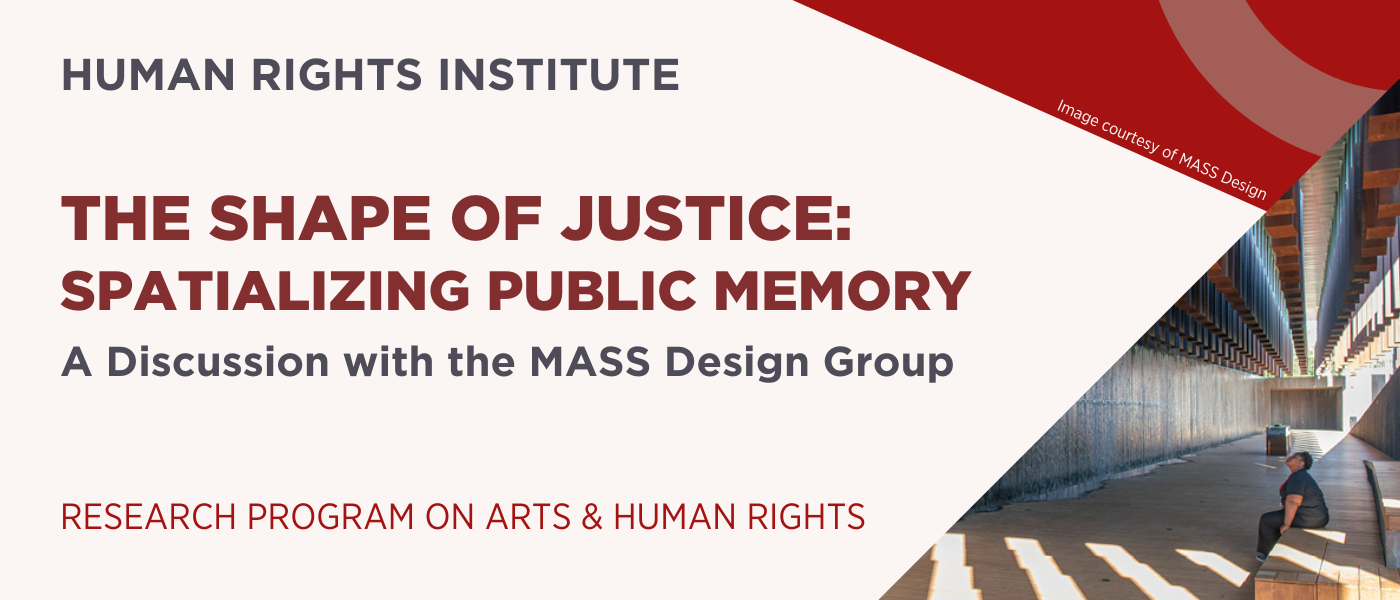
Members of MASS Design Group will speak on their transformative practice of “spatializing memory.” In projects such as The National Memorial for Peace and Justice (Alabama) and the Martin Luther King Jr Memorial (Boston), MASS Design explores new ways to shift narratives, serve as a catalyst for truth-telling, and advance collective healing through the built environment.
Konover Auditorium
Dodd Center for Human Rights
Please register to join us.
Elena Baranes
Senior Designer, Sustainable Native Communities Design Lab, MASS Design Group
Brandon Bibby
Senior Architect, Public Memory and Memorial Lab, MASS Design Group
Morgan O’Hara
Manager, Advancement, Public Memory and Memorial Lab, MASS Design Group
Annie Wang
Senior Designer, MASS Design Group
Elena joined MASS in January of 2019. Her work with the Sustainable Native Communities Design Lab and the Restorative Justice Design Lab focuses on engagement and design that elevates community voices. Her partnerships and projects seek to address the future of Indigenous sovereignty, healing through the arts and education, and decarceration. Prior to joining MASS, Elena worked as part of a Los Angeles-based design-build team. She received her Masters of Architecture from Yale School of Architecture and her Bachelor of Arts from Boston University.
Brandon Bibby AIA, ASID, NOMA, NCARB, WELL AP is a Senior Architect with MASS Design Group. Bibby joined MASS in 2021 as a Space and Society Fellow and currently works and manages research, engagement, and design across various Public Memory and Memorial Lab projects. Raised in the plains of Arkansas, where the Delta meets the Ozarks, Bibby is an artist, activist, and architect motivated by movement, culture, and familiarity in contemporary black and southern spaces. His work is rooted in preserving and developing architecture and dignified design in marginalized communities of color to address the lack of representation and access to equitable and quality design in the built environment. His diverse portfolio includes design, programming, and project management on over 100 preservation, arts, educational, commercial, and healthcare projects. Celebrated for his design leadership and community activism, Bibby was named a 2022 Ones To Watch Scholar with the American Society of Interior Design, recipient of the Alpha Rho Chi Bronze Medal, and was named the Arkansas Business’ 20 in their 20s New Influential 2019 Class. He has lectured, and moderated panels with the American Institute of Architects, Architecture and Design Network, AARP, and currently serves as a Health Equity Advisor with the International Well Building Institute.
Morgan O’Hara is a cultural historian of cities and the built environment. She has worked at MASS Design Group since 2018, where she conducts research to support built projects and exhibitions, and crafts written work alongside strategy for business development. Her backgrounds in cultural research, public history, and collaborative design have informed her approach to socio-spatial research to develop human-centered histories of urban space and infrastructural systems. For the Fringe Cities project, Morgan conducted longitudinal analyses of small cities in the United States that participated in mid-century urban renewal, and while at the Hudson Valley Office, she was embedded in the public engagement work necessary to craft meaningful community design solutions in Poughkeepsie. Her passion lies in elevating creative and community-driven expressions of lesser-known histories in public space. Morgan studied anthropology at Reed College and graduated from Columbia with a Masters in Historic Preservation. She has served as co-faculty for Studio II in Historic Preservation at Columbia GSAPP since 2021.
Annie joined MASS in February of 2018 as a Design Associate and is currently working on a kindergarten in Vietnam and a health clinic in Texas. Before MASS, she worked at Peter Rose + Partners and AMO/OMA in Rotterdam where she conducted research for publications and editing. She received her Bachelor of Art in psychology and architecture from the University of Toronto and her Master of Architecture I from Harvard Graduate School of Design.
This event is sponsored by the Research Program on Arts & Human Rights.
The Research Program on Arts & Human Rights explores how the arts can promote the full exercise of human rights and the consolidation of a democratic culture. The arts not only make human rights visible. They also advance democratic thinking as they help us imagine new futures and open unique spaces for dialogue and debate, ushering us into novel modes of experience that provide concrete grounds for rethinking our relationship to one another. Thus, the arts can act as a powerful means of sustaining individual and collective reflection on human rights, and of linking individual and collective public experience, social belonging and citizenship.
Tuesday, October 4, 2022
2:00pm – 3:30pm
Hybrid Event
Dodd Center for Human Rights – Room 162 & Zoom
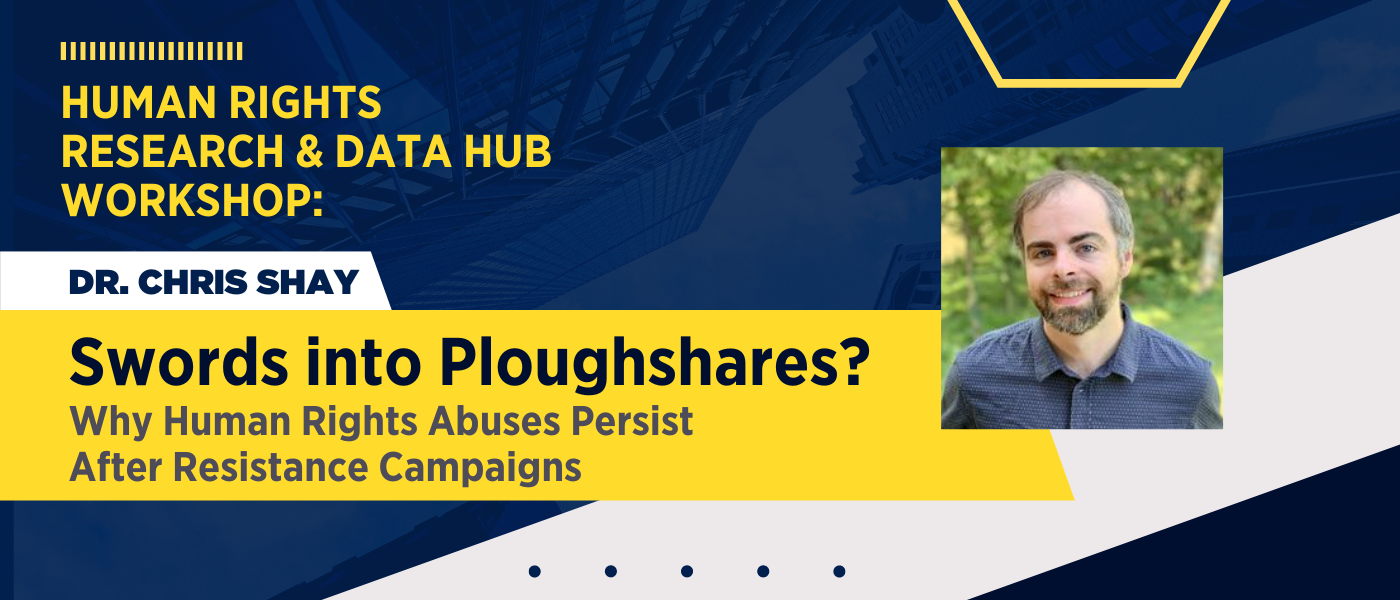
In this Human Rights Research and Data Hub Workshop, Dr. Chris Shay will present his research on human rights abuse in the context of national crises. Human rights abuse tends to increase during national crises, such as civil wars and mass nonviolent uprisings. Under what conditions does this abuse abate or persist? Shay argues that violent challenges provoke much more coercive state responses – exposing more personnel within the security forces to extreme forms of repression and priming them (both leaders and followers) to reproduce these behaviors after the conflict has terminated. This effect is mitigated or avoided when challengers rely on nonviolent tactics instead of violence, leading to less post-conflict abuse. I test this argument with several quantitative methods, showing that nonviolent resistance campaigns lead to fewer post-campaign political killings and extrajudicial executions than violent campaigns. This effect is partially – but not fully – mediated by democratization: nonviolent methods reduce repression by promoting democratization, but the effect is present even in the absence of democratization (the majority of cases). Results also suggest that democratization cannot fully counteract the repressive legacies of violent conflict. By choosing to specialize in nonviolent tactics, therefore, resistance leaders avoid a repression trap that not even democratization can fully disarm.
Join us in person:
The Dodd Center for Human Rights – Room 162
Please register still to receive updates.
Join us online:
Register to receive Zoom login information.
Christopher Wiley Shay
Postdoctoral Research Fellow
UConn Human Rights Institute
Dr. Christopher Wiley Shay is a Post-doctoral Research Associate at the University of Connecticut Human Rights Institute and an International Security Program Fellow at the Harvard Kennedy School’s Belfer Center. His research focuses on armed insurgencies, civil resistance movements, and their effects on societies and governments. Drawing on a diverse array of quantitative and field-based methodologies, Shay’s doctoral research shows how domestic civil-military dynamics and international institutions influence post-conflict human rights outcomes. In other words, this research explains why surprisingly few countries (including new democracies) manage to break out of the “repression trap.” His work has been featured in venues such as the Journal of Global Security Studies, the Journal of Peace Research (forthcoming), and Political Violence at a Glance.
Shay also manages the Nonviolent and Violent Campaigns and Outcomes (NAVCO 2.1) data project with Dr. Erica Chenoweth and involved in the research team that maintains the Socio-Economic Rights Fulfillment Index with Dr. Susan Randolph. In the past, he has provided analysis on India’s long-running Maoist insurgency (the “Naxalites”) to the International Institute of Strategic Studies. He received his Ph.D. (International Studies) from the University of Denver’s Josef Korbel School and a master’s degree (Peace and Conflict Studies) from Uppsala University.
Prior to his graduate studies, Christopher was an outdoor educator and (for brief periods) a wildland firefighter. He holds a bachelor’s degree from Hanover College.
This event is sponsored by the Human Rights Research and Data Hub (HuRRD) at the Human Rights Institute. The Hub seeks to advance human rights research at UConn by supporting faculty and student projects and providing students the opportunity to develop research and data analysis skills that will advance their careers after graduation.
Thursday, October 27, 2022
5:00pm – 6:15pm
In Person Event
UConn School of Business – Room 321
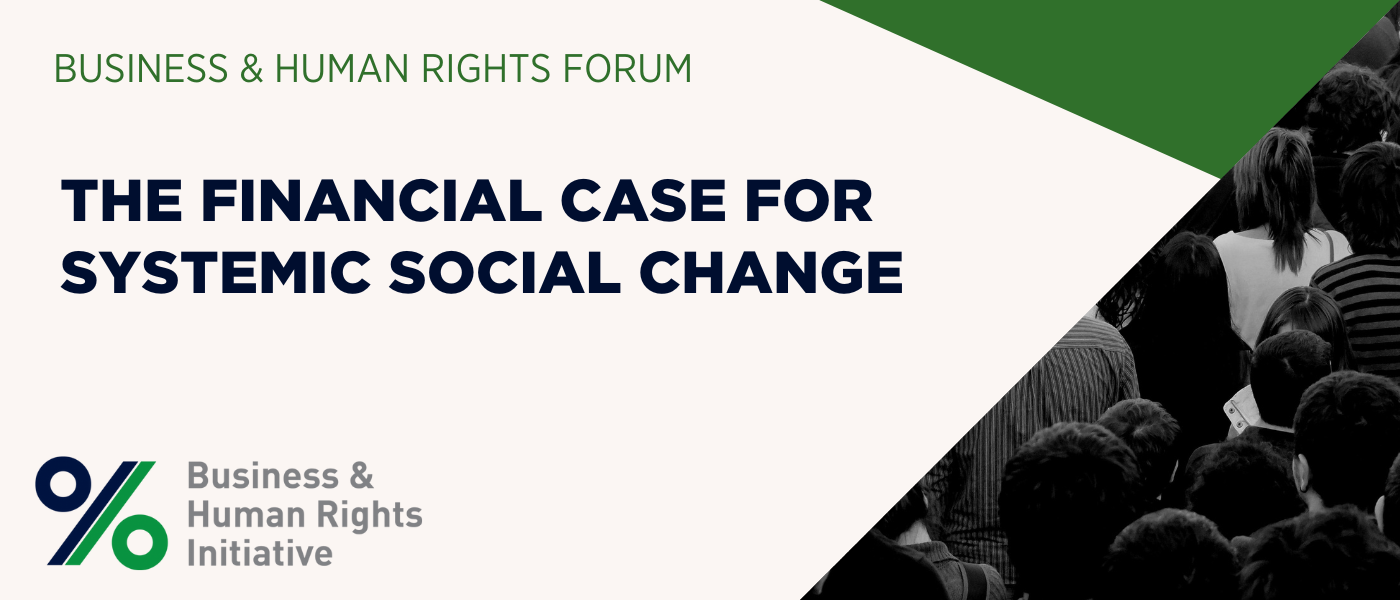
The social and environmental challenges of today—climate change, income inequality, modern slavery and human trafficking, systemic racism, the human costs of war, the COVID-19 pandemic, among others—are complex and interconnected issues. The systemic nature of these challenges poses risks to investors across their portfolios. They also provide opportunities for investors to think about impact systemically in a manner that promotes sustainability and respect for human rights while also adding to the bottom line. Join us for a presentation and discussion with representatives of The Investment Integration Project (TIIP), a leader in system-level investing.
Presenters:
Moderators:
Stephen Park
Co-Director, Business and Human Rights Initiative
Associate Professor of Business Law
Rachel Chambers
Co-Director, Business and Human Rights Initiative
Assistant Professor of Business Law

William (Bill) Burckart
CEO, The Investment Integration Project (TIIP)
William (Bill) Burckart is the CEO of The Investment Integration Project (TIIP), an applied research and consulting services firm that helps investors manage systemic risks and opportunities. He is also co-founder of Colorful Capital, which is bringing capital support and scaffolding to enterprises founded and led by members of the broad LGBTQIA+ community, and a Fellow of the High Meadows Institute. He previously served as a member of the advisory council of the Investments & Wealth Institute’s WealthBoard 100 and as a visiting scholar at the U.S. Federal Reserve. He is the co-author of “21st Century Investing: Redirecting Financial Strategies to Drive Systems Change” (Berrett-Koehler, 2021) and co-editor of “New Frontiers of Philanthropy: A Guide to the New Tools and New Actors that Are Reshaping Global Philanthropy and Social Investing” (Oxford University Press, 2014). He is a founder or co-founder of two impact investment advisory firms, Burckart Consulting and Impact Economy LLC. His writing and perspective has been featured in Barron’s, Bloomberg, Pensions & Investments, The Guardian, Forbes, Quartz, top1000funds, Investment & Pensions Europe (I&PE), Benefits & Pensions, InvestmentNews, Stanford Social Innovation Review (SSIR), ImpactAlpha, The Chronicle of Philanthropy, and FundFire to name a few.

Kilian Moote
Managing Director, Georgeson
Kilian Moote is a Managing Director within Georgeson’s ESG advisory practice, where he is building the firm’s ESG advisory practice. As a social entrepreneur he has helped develop and managed numerous initiatives or organizations at the intersection of purpose and profit.
Kilian has 15 years of experience working with executives and investors on human and labor rights, including leading the development of the labor rights benchmark KnowTheChain and launching two collaborative funds – Funders Organized for Rights in the Global Economy and Moving the Market. Prior to joining Georgeson, Kilian developed and managed strategies on corporate accountability and public policy for the private foundation Humanity United. He has deep expertise on responsible supply chain management, having previously taught an MBA course at the University of San Francisco. As a leading advocate on social and human capital issues he’s frequently called on to provide guidance. He is currently advising The Investment Integration Project and involved in various effort to enhance human capital management and human rights standards. Kilian earned an MBA with Distinction from the Imperial College Business School in London and a Bachelor of Arts from the University of San Francisco.
This forum will be hosted in person. Please register to join us. This event will not be recorded.
This event is hosted by the Business & Human Rights Initiative, a partnership between Dodd Human Rights Impact, the UConn School of Business, and the Human Rights Institute.